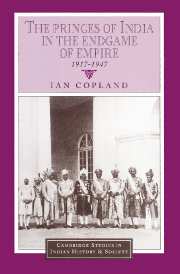3 - A vision splendid
Published online by Cambridge University Press: 30 October 2009
Summary
The transcendental merit of this constitution is that it provides for one government for the whole of India … It is the Vision Splendid [that] many dreamt of; [but] none hoped to realise in their own days.
The Times of India, 5 March 1931Flirtations with nationalists
Historians of colonial India have generally glossed over the long and complicated saga of all-India federation: partly, one suspects, because it was long and complicated, but also because, as we shall see in chapter 5, this grandest of imperial projects had finally to be abandoned. We need not spend too much time on this episode, the argument runs, since federation, at least in the form in which it was conceived in 1930, was doomed from the start. There are several problems with this view, however. For one thing, it represents a victory for smug hindsight. For another, it significantly underrates how close the federal scheme of 1930, embodied in the India Act of 1935, came to being implemented (before the outbreak of war in 1939 forced the project to be shelved). For a third, it overlooks the fatal impact of the ‘failure’ of federation on the compact between the princes and their British overlords. Last but not least, it ignores a significant strand in the politics of the 1930s, for this was one time – and perhaps the only time – that the princes occupied the front of the Indian political stage, and had an opportunity to shape their own destiny. How this position of advantage came about, and how it was utilised by the rulers, forms the central theme of this chapter.
- Type
- Chapter
- Information
- The Princes of India in the Endgame of Empire, 1917–1947 , pp. 73 - 112Publisher: Cambridge University PressPrint publication year: 1997

